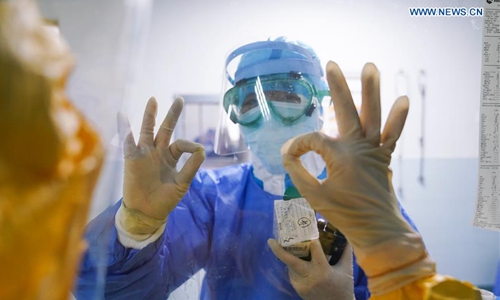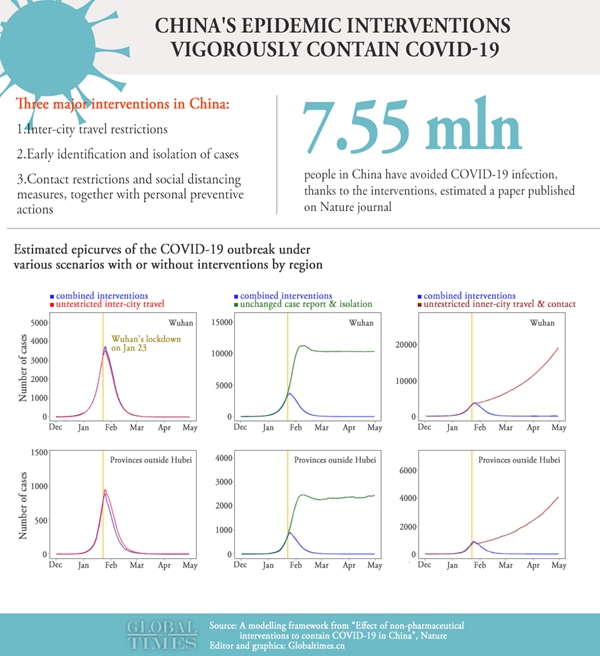Interventions avoid 7m infections in China: Nature study
By Wan Lin Source:Global Times Published: 2020/5/7 19:18:08

Medical workers gesture to each other through the window in Zhangzhou Municipal Hospital in Zhangzhou, southeast China's Fujian Province, Feb. 2, 2020. Zhangzhou Municipal Hospital is a designated hospital to treat patients infected with the novel coronavirus in the city. It has started receiving patients with its emergency wards since Jan. 26 in a bid to fight against the virus outbreak. (Photo by Xiao Heyong/Xinhua)
Collaborative research by Chinese, US and British scientists proves that China's strict COVID-19 prevention and control measures effectively contained the virus' spread and mitigated the effects of COVID-19 in other regions around the world.The results of the study, published in top academic journal Nature, suggested that without China's non-pharmaceutical interventions (NPIs) including city lockdowns, early quarantines and closure of public places, infections could have increased 67 times to 7.7 million in the country by February. The country has reported some 82,000 cases so far.
Lai Shengjie, a member of the research team and senior research fellow with the University of Southampton, told the Global Times on Thursday that if these interventions had not been taken, the number of cases in China would have overwhelmed the carrying capacity, as well as the prevention and control capacity, of the medical and health systems, leading to more deaths and a more serious and uncontrollable situation.

Infographic: Globaltimes.cn
"China's active and comprehensive NPIs effectively contained the further spread of the epidemic and bought valuable time for the prevention and control of the pandemic worldwide," Lai said.
If the NPIs had been conducted one, two or three weeks later, cases could have shown a 3-fold, 7-fold, or 18-fold increase.
The study also found that if interventions in China had been conducted one week earlier, cases could have been reduced by 66 percent.
The study was done by a model based on travel networks to simulate different outbreak and intervention scenarios across China.
Three major NPIs integrated into the model were inter-city travel restrictions, early detection and isolation of cases, and contact restrictions and social distancing measures like the closure of public places.
The study indicated that early detection and isolation did more to curb the contagion than the other two NPIs, but all three combined interventions achieved the strongest and most rapid effects.
Lai suggested that countries that are currently fighting the pandemic should actively develop, adopt and adjust NPI strategies in a timely manner to minimize the health, social and economic impacts of new outbreaks.
The research, done in February, did not take asymptomatic infections and imported cases into account. But Lai noted that China's follow-up measures have proved to be effective in preventing a rebound in infections.
The research will further look into the effect of wearing masks and improving personal hygiene habits, such as hand washing, on epidemic prevention and control, he said.
Posted in: SOCIETY